Khoury News
ALTruism, ALTogether: Stephen Alt’s unique robotics journey
ALTruism, ALTogether: Stephen Alt’s unique robotics journey
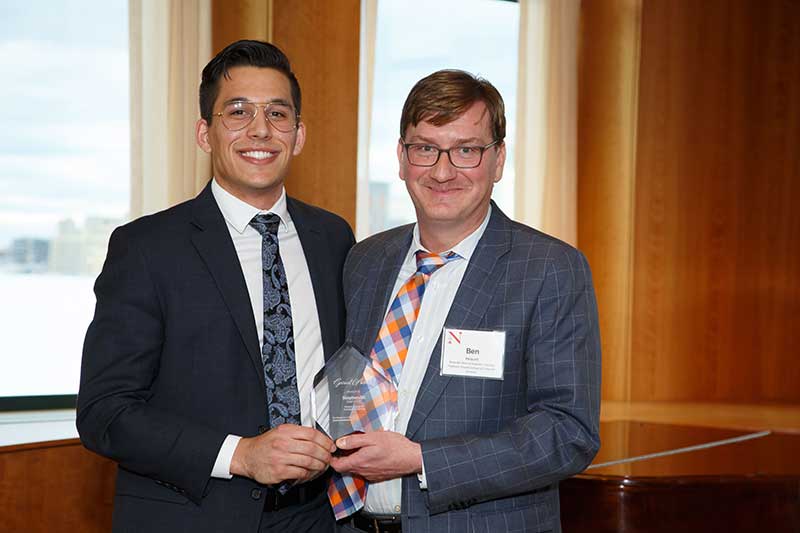
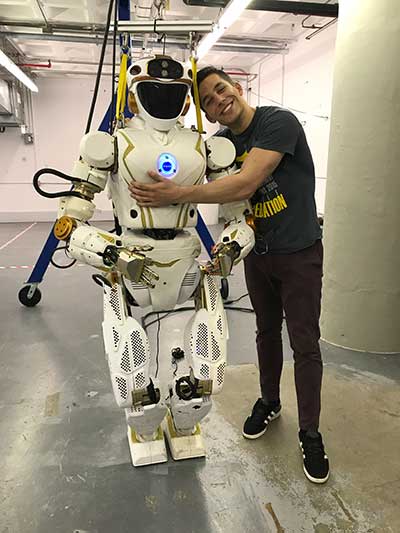
Each year, the Khoury College of Computer Sciences attracts talented, enthusiastic students who go on to success in academia, industry, or their communities, and sometimes all three. Most arrive at Northeastern knowing they’ll pursue computer science in some form.
Stephen Alt arrived without a clue what his major would be, but five years later, you’d never guess. With a new computer science and physics diploma in hand and his master’s degree a year away, his ever-ballooning portfolio centers on one theme: merging his software skills with robotics to better the world.
Finding My Way
“Someone once told me, ‘Computers are just zeros and ones,’ and before I came to college, that was legitimately all I knew,” Alt said. “I never knew how to code. I never knew what a programming language was.”
Alt did know what he wanted to address when he arrived at Northeastern in 2016, though. After losing his father at an early age, he’d been raised by his mother and grandmother. Through dozens of visits to museums about underrepresented minorities and hundreds of volunteering hours, the two instilled in Alt the importance of social justice.
“From a very young age I was aware of social wrongdoings,” Alt said. “I wanted to give back to the world, to cherish my life and do things that benefited those around me.”
At the start of his sophomore year, Alt declared a double major in computer science and physics. He saw humanitarian potential in robotics — particularly when blended with software advances — as a way to perform dangerous assembly-line and mining work often done by children.
Not that this newfound computing interest meant he was good at it.
“I was confused because my mind wasn’t open enough,” Alt admitted. “You don’t recognize how everything runs off of computer algorithms.”
But Alt soon met other struggling students, befriended them, and grew with them. Once he grasped the scope of the field, the concepts seemed more rational, and his insecurities dissolved. Alt says he finally found his confidence during “Fundamentals of Computer Science 2” with Professor Leena Razzaq, who he considers a confidant and role model.
“He’s a good student, and very serious,” Razzaq said of Alt. “He found some of the stuff difficult, but he put in the work and did pretty well.”
By this time, Alt had also found the interdisciplinary zone where he could make his positive global impact. Robotics engineering was the body and software was the brain, and using artificial intelligence, he wanted to give the body the brain it deserved.
RIVeR Flows in You
“Humans need to get off the planet. We have to go to space.”
That speech, which inspired a first-year Alt to join Northeastern’s Robotics and Intelligent Vehicles Research (RIVeR) Laboratory, was given by the lab’s founder and director Taskin Padir. The lab focuses on human–robot teaming while allowing students to explore sub-missions.
What most attracted Alt was Valkyrie, a robot NASA designed as a space-traveling, task-assisting companion for its astronauts. The RIVeR Lab had acquired a Valkyrie robot during Padir’s first year at Northeastern, and more than 100 students, including Alt, have worked on motion-related algorithms and behaviors for it since.
“Getting a humanoid robot to walk is extremely challenging, so we focused on improving the control system,” Alt explained. “Working on this robot contributed a lot to my passion and opened my eyes to the potential of robots to help humanity.”
It also began his RIVeR Lab journey.
“I told Professor Padir, ‘This is what I want to do with my life,’” Alt recalled. “He’s super supportive, an amazing mentor just like Professor Razzaq. He invested a lot into me and was extremely patient.”
“I have one prerequisite: commitment,” Padir said. “When Stephen first showed up, he had no idea about robotics. But he impressed us by saying, ‘I’m ready to listen and learn.’ That can-do attitude kept him going.”
His attitude also helped Alt overcome major hurdles, namely a lack of original research experience that initially confined him to minor lab tasks.
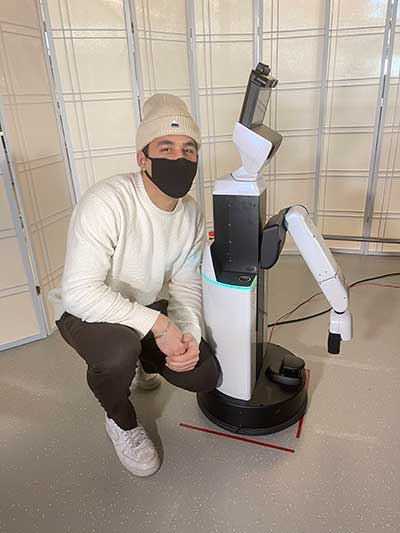
“Joining the lab changed my life. My best friends are all PhD students in this lab; they’re like brothers and sisters to me,” Alt said. Murphy Wonsick, Velin Dimitrov, and Tarik Kelestemur “mentored and supported me and taught me how to research. They never gave up on me and that really motivated me.”
In Alt’s fourth year, he collaborated with Wonsick, Kelestemur, and Padir to improve object recognition models inside virtual reality headsets, making them more accurate and detailed, and thus making the user feel more like they’re walking in the robot’s shoes. Further advances could eventually allow human users to avoid dangerous environments by sending robots instead. The team’s paper was accepted at the elite IROS robotics conference in September 2021.
That same month, Alt got his first taste of robotics competition at the renowned Avatar XPrize in Miami. As pandemic mitigation measures highlighted the value of remotely controlled robots, Northeastern’s team rose to the challenge by crafting “Robalto the Husky,” an arm-and-mobile-base robot that can perform numerous physical tasks. While most competitions have teams showcase their creations, Avatar XPrize judges put the robots through their paces themselves, emphasizing the importance of user-friendliness.
“We combined the unique mechanical engineering technology developed by Professor Peter Whitney with our expertise in systems and algorithms, and exited the semifinals as the top-ranked American team, trailing only the Germans and Russians,” Padir said. “Stephen was a key player. I sometimes call him ‘the nudger’ because he keeps track of what needs to be done and has that energy to motivate the whole team.”
The team won $150,000 in semifinals prize money, which the RIVeR Lab used to recoup project costs and fund the team for finals this fall. Should they place in the top three, they will win between $2 and $5 million, enough for each team member to pocket a hefty chunk.
“The great thing is, our system has so much room for improvement,” Alt said, citing the robot’s base and human interaction. “This is mind-blowing … What an incredible experience!”
Nor was it the only one. A couple of months earlier, Alt had spent his summer at the International Elite Summer School in Robotics and Entrepreneurship in Odense, Denmark. Of Northeastern’s six participants, he was both the only Khoury College student and the only undergrad among a cohort of engineering doctoral candidates.
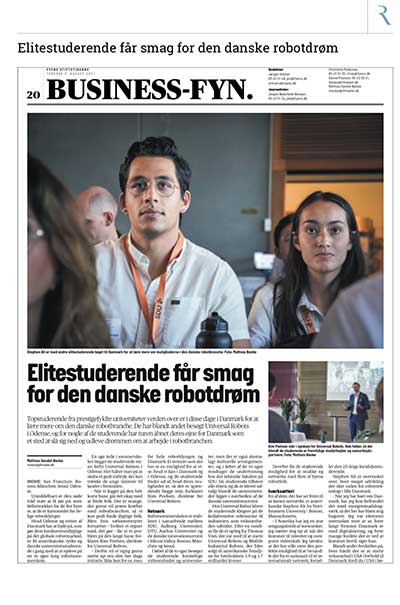
“It was conference style; the best roboticists from the European Union came and spoke about their research, and we got to tour the big robotics companies,” Alt said. He also worked on a project with a Danish professor who had started a company to detect early-onset arthritis, and whose software boasted an 87 percent accuracy rate. Alt and his fellow students developed a deep-learning-based addition that improved the accuracy to 94 percent.
The local scientific culture was also key. As Alt’s trip companion Syed Mohammad Asjad noted, Danish companies generally invest in each other and share resources rather than competing. The cross-cultural program shares that collaborative ethos, as Alt discovered when he discussed his projects and interests with the CEO of manufacturing giant Universal Robots. The CEO’s response: gifting Alt one of his company’s $30,000 robot arms.
“I learned a ton and met amazing people,” Alt concluded. “Diversity and inclusion is so core to me, and this was a group of people from all over the world. Just incredible.”
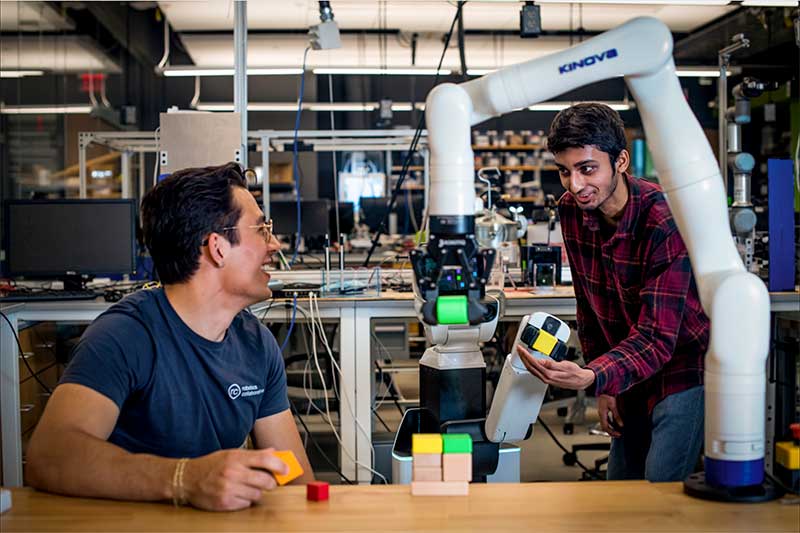
With You There to Help Me
So far, Alt’s most direct contributions to social justice have come not through robotics, but through teaching. He began working as a TA in the fall of his sophomore year, in the class where he’d recently found his computer science mojo: Fundies 2 with Leena Razzaq.
“Stephen was an awesome TA, and very helpful,” Razzaq said. “He was really great with the students. I’d always hire him whenever he was available. I think the students really liked him, and could talk to him without feeling judged.”
“I believe that teaching people is the best way to spread knowledge and expand your impact,” Alt said. He applied similar lessons as a teaching fellow for computer science and physics courses. “I want people to learn from my mistakes so they can avoid those mistakes or power through them … the main thing I did through these experiences was to build confidence in others.”
Alt has also taught in the lab. The RIVeR Lab’s open-ended setup, in which ambiguity fosters collaborative problem-solving, encourages young roboticists to become mentors.
“Stephen’s mentors took him under their wings, he persevered, and now he’s a mentor to many undergrads,” Padir said. Alt took to the role “very naturally, because that’s how he was trained. Someone mentored you to learn a new skill and added value to your career or personality, and now it’s your turn.”
Alt’s teaching experience hasn’t been confined to campus. In 2018, he joined a local branch of Girls Who Code, where, for three years, he designed curricula and taught typing, mathematics, functional programming, object-oriented programming, web development, game development, and web design in the under-resourced neighborhood of Dorchester. He noted that many of his students later earned admission to elite technical high schools.
“These girls would come to us not knowing how to type, and we were trying to teach them how to code,” Alt said. “It’s extremely humbling and rewarding because you become more than a teacher. You’re creating a family.”
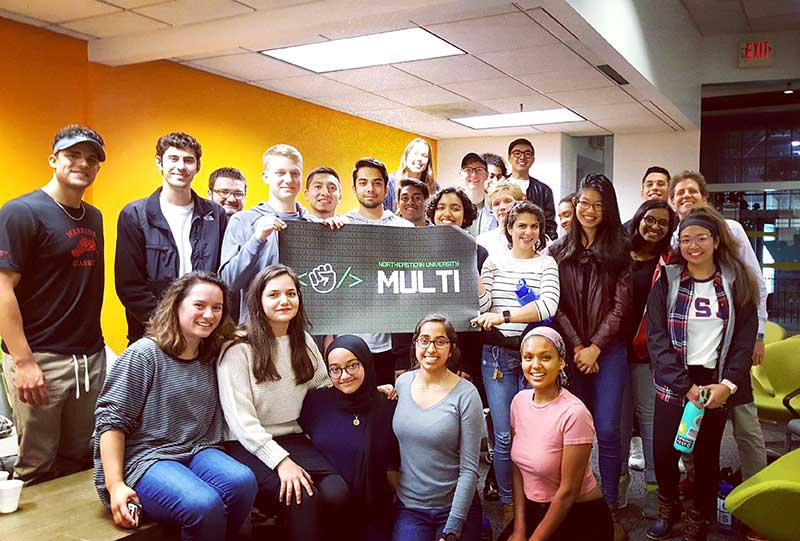
By fostering diversity in computer science, Girls Who Code shares something with Multi-diverse Unified Leaders in the Technology Industry (MULTI), a student organization Alt co-founded in 2017. He cited his own struggles fitting in and stacking up in computer science classes, challenges that often compound for minority students.
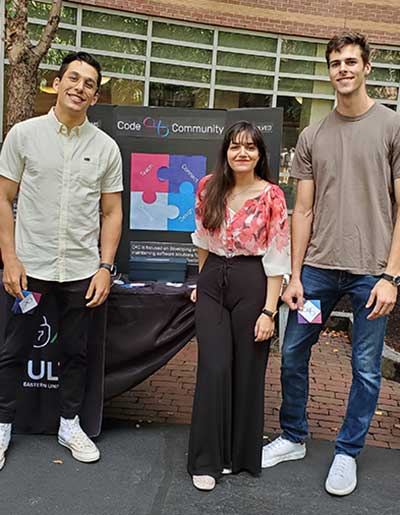
“I saw the impact of sexism at an early age, which allowed me to see the impacts of racism and other social issues,” Alt said. “We needed to create a club for people who were struggling, to show the importance of support and diversity in the tech industry.”
And just to round things out, Alt co-founded and led Code4Community, a student club that develops and maintains free software solutions for Boston nonprofits that otherwise couldn’t afford them. Among others, they have designed web apps for Speak for the Trees Boston, which aims to enlarge and improve Boston’s urban forest, and Lucy’s Love Bus, which strives to boost quality of life for children with life-threatening illnesses.
READ: Khoury College student club gives back to Boston through code and design
Throw in a couple of co-ops at IBM Research and a stint as a Khoury Advisory Board liaison, and it’s a resounding undergraduate résumé for a computer scientist with lofty interdisciplinary and humanitarian goals.
“Teaching and helping others is super important to me, so I always want to make sure I’m doing that,” Alt said, citing classes, a research lab, a start-up, or a mix of the three as possibilities. “Hopefully I’ll work on projects that are beneficial to the world.”
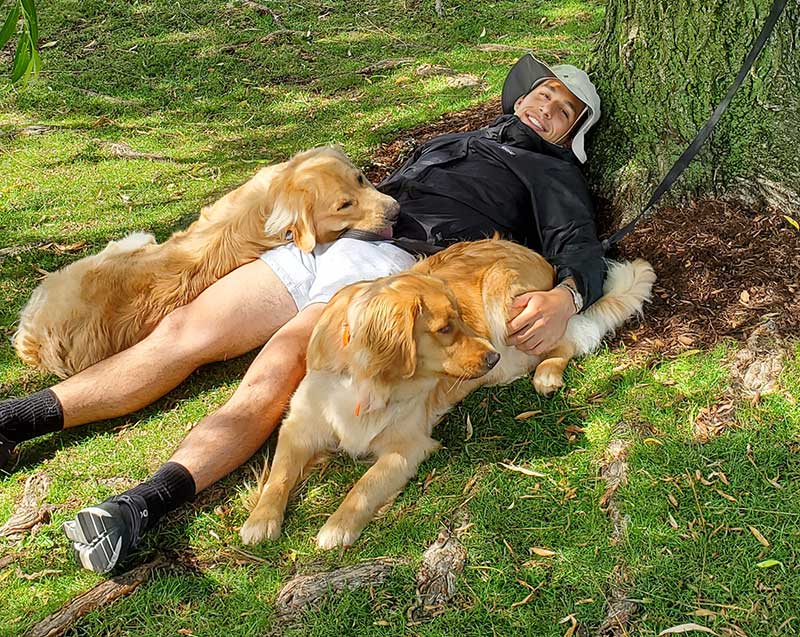
The Khoury Network: Be in the know
Subscribe now to our monthly newsletter for the latest stories and achievements of our students and faculty